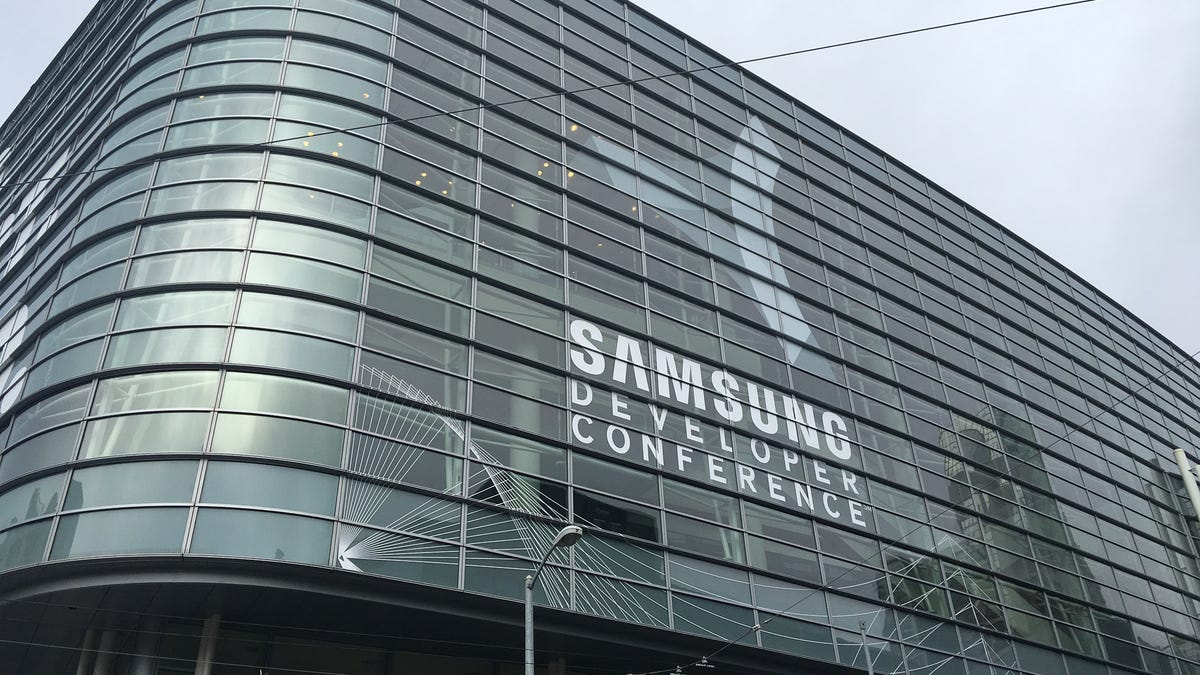Samsung's pitch to developers: We're really, really big
Samsung wants people to make apps for everything from virtual reality to the smart home.

Samsung really wants you to make apps tailored for its devices, not just generic Android software.
The company this week is making its pitch for why developers should be tweaking their apps to take advantage of features like the S Pen on Samsung's Note devices or its Gear S2 smartwatch. The biggest reason is simply because Samsung is big in a large market.
"For the first time in history, there are more devices on the Internet than there are people," Dongjin Koh, the new president of Samsung's mobile business, said Wednesday as he kicked off a keynote at the company's developer conference. By 2020, there will be 21 billion connected devices, Koh said.
Companies have shipped more than 7.7 billion phones, 3.4 billion smartphones and 5 billion connected devices, said Injong Rhee, executive vice president and head of R&D for software and services in Samsung's mobile business. About 80 percent of those smartphones run Android, and the vast majority of Android devices on the market are made by Samsung.
"The user base is growing beyond hundreds of millions of devices and customers and is soon to be billions of customers and device coverage we're going to have," Rhee said. "That's a huge market. You don't get that kind of scale anywhere else."
Samsung hasn't had a good reputation with software, but Koh said the company is "listening to developers, embracing software and services, and making our corporate culture more open and collaborative."
Wooing app makers
Samsung this week is hosting a developer conference at the Moscone Center in San Francisco, the same location Apple will hold its developer confab in June. About 4,000 developers are attending Samsung's event, including five teenage student coders. One is as young as 12 years old.
Emily Waite, a 17-year-old from Franklin, Massachusetts, is one student attending SDC as part of Samsung's Mobile App Academy. The weeklong summer program teaches students coding and helps them make their own apps. Waite, who taught herself to code when she was in eighth grade, won the $20,000 scholarship grand prize for her app, Med Kid. It helps children who are seriously ill take their medications accurately.
"My generation, it will be interesting to see what we build because we grew up with technology," Waite said in an interview. "We're much more fluent in tech."
Samsung has had difficulty generating enthusiasm for many of its software products. The company leans on Google's Android software to run the vast majority of its smartphones and tablets, while its own Tizen operating system has struggled to gain a foothold. Meanwhile, Samsung has scrapped many of the services it's created, like the Samsung Media Hub and Milk Video.
Samsung held its first developer conference in late 2013 in an effort to set itself apart from all the other Android vendors in the market. It's getting harder and harder to differentiate on hardware alone, and Samsung needs developers to boost its own ecosystem and connect its various devices together, including its VR headsets and Gear smartwatches. That will make customers more loyal to its devices and give them software and services they really use.
From autos to VR
A rapid succession of executives took the stage during Samsung's 2-hour keynote to talk about Samsung Pay, virtual reality, Samsung's own Tizen software, smart TVs, automotive, chips, the smart home and Samsung's accelerator to help grow startups.
Samsung's Otto prototype device is a smart robot that can show emotions and respond to questions.
Rhee talked up Samsung's Knox security software and gave hints of the future of virtual reality, at least according to Samsung. That includes headsets that can track motion, which appears to let you do things like ride a VR surfboard, and untethered headsets so you don't need to be plugged in for power. Samsung also wants to let you touch virtual items and give a "holodeck experience," which lets you create a virtual world like in "Star Trek."
"VR is amazing, but the industry is still in infancy," Rhee said. "You're going to see a lot of our products coming on to market in the next few years with these kinds of capabilities."
Samsung also said its Gear 360 camera will be available Friday in Korea and Singapore, though it didn't confirm pricing.
Nathalie Oestmann, one of the executives in charge of Samsung Pay, talked up new features like being able to withdraw cash at the ATM using your Galaxy device, though it's only in Korea right now.
Curtis Sasaki, Samsung vice president of ecosystems and Internet of Things general manager, made a pitch for why companies should use Samsung's Artik chip system to build products like smart robots and light switches.
"I don't think any other company is going to this length to build this quality of reference designs," Sasaki said in an interview.
Updated at 3:30 p.m. PT with comments from student coder.
Corrected at 9 a.m. PT on April 28: Clarifies the market size figures are the total market, not just what Samsung sold.

